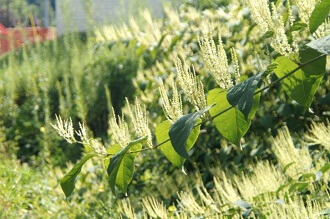Landowners Win Right to Sue Over Fast-Spreading Weeds
Landowners Win Right to Sue Over Fast-Spreading Weeds

Landowners in England and Wales may now have the right to claim against neighbours for property damage caused by the Japanese knotweed plant, the Court of Appeal has ruled.
Upholding a decision from the lower court, the judges determined that two Welsh homeowners were entitled to receive damages from Network Rail under a private nuisance claim, after knotweed from the company’s railway embankment spread to their homes.
The plant, which is illegal to grow in the wild, is fast-growing, with extensive root networks that can interfere with building foundations and drainage. The ruling could have far-reaching implications for the success of nuisance claims in cases where the “pernicious weed” spreads to a landowner’s premises from another property.
Members of the Property Care Association estimate that Network Rail could stand to pay millions to settle further weed claims arising from the ruling. The decision is most likely to affect commercial landowners, rather than individual homeowners whose knotweed infestation spreads onto neighbouring land.
Claimants awarded £10,000 each for weed’s effect on property value
In the present case, the court found in favour of the claimants because Network Rail had known about the weed’s presence on its land, and failed to reasonably prevent its spread to the claimants’ premises.
Companies that can show that they took reasonable steps to prevent the weed from spreading to neighbouring properties may be able to avoid paying damages. Crucially, the weeds in this case had negatively affected the land of the claimants, rather than just its value – fulfilling a prerequisite for private nuisance claims. For private nuisance claims to succeed, a landowner must illustrate that their ability to use and enjoy their land has been sufficiently affected by the interference.
Delivering the judgement in the Court of Appeal, Sir Terence Egerton emphasised that such claims must be founded on a “violation of real property rights” – underlining that effects on property value alone will not be enough.
“The purpose of the tort of nuisance is not to protect the value of a property as an investment or a financial asset…[but to] protect the owner…in their use and enjoyment of the land,” Sir Terence affirmed.
However, it is important to note that while claims will only succeed on the basis of actual effects on a proprietor’s enjoyment of their land, damages may still be awarded in successful claims for harm done to property value.
In the Network Rail case, each claimant was awarded £4,320 to treat the knotweed and approximately a further £10,000 to compensate for a decline in their house’s market value.
Guarding against knotweed
Japanese knotweed – which can grow up at a rate of a foot a week – damages land by weakening walls and brickwork, blocking pipes and contaminating soil. The Wildlife and Countryside Act 1981 makes it a criminal offence to grow knotweed in the wild, with those found guilty subject to a £5,000 fine or even a prison sentence of up to two years.
Since insurance policies often do not cover damage caused by knotweed, its presence can discourage lenders from granting a mortgage, and housing values can suffer.
As judges in the Network Rail case noted, the weed “imposes an immediate burden on landowners” in terms of dealing with the “difficulties and expense of eradicating” the plant from affected land.
The plant is classed as “controlled waste” under the Environmental Protection Act 1980, meaning that it must be disposed of safely, in line with strict regulations. Businesses that find the plant growing on their premises should either dispose of it at a licensed landfill site or otherwise destroy it, by burning, burial or spraying the affected area with strong pesticides. Digging out the roots can be an extensive procedure – they are able to grow 3m deep and 7m wide – whilst spraying the area with pesticides requires repeated application over a period of two to four years.
Contact our property disputes and nuisance claims solicitors today
If you are concerned about a property dispute or need the advice of a mediator to settle a dispute between yourself and a homeowner or commercial landowner, or if you have been adversely affected by the negligence of a property professional such as a surveyor, call us in confidence on 03456 381381 or email propertydisputes@ibblaw.co.uk.

